2024 reading survey questions
where I discuss the books from 2024 that made me feel some time of way - biggest disappointment, unexpected favourite, books I recommend to everyone, etc.
Behold! My detailed musings about certain books I read in 2024! I go through various questions, including:
My favourite new author
Books that lived up to the hype
Biggest disappointments
Books that made me feel like reading is a chore
Unexpected loves
My personal hall of famers
Books I think everyone should read
Series that I didn’t finish
DNFs
1. Favourite new author?
I sincerely hope that Caroline O’Donoghue isn’t secretly evil, because I’ve invested too much of my life and energy into reading her entire catalog. I’m cheating a little bit by entering her as my favourite “new” author - I read her debut adult novel Scenes of a Graphic Nature in 2023 and remember it didn’t make too much of an impact on me due to some issues in the plot and pacing, but she came back into my life in a big way with The Rachel Incident and the Gifts series, both about girls in Ireland making it through a difficult time!
The Rachel Incident is one of my new ultimate favourites. I think the marketing of the book is misleading because they feel that they can’t say too much to preserve an air of scandal and mystery. It’s being sold as a Lena Dunham’s Girls-esque story about the main character crashing out because she has an affair with her English professor, but it’s actually a very tender consideration about what it’s like to be a young woman in your early 20s when your country is constantly on the verge of falling into shambles.
The problem with white women fiction set in America is that the characters never have to wrestle with the existential angst of belonging to a failing state. While this state of affairs is increasingly changing (re: 2024 USA election), the imaginations of millennial women authors have yet to catch up. People move too smoothly through the world because there is always possibility and success waiting around the corner. There is no need for internal momentum within characters when the external factors are always so perfectly set up to propel the protagonists forward. This state of forward inertia cannot be applied to those of us in unremarkable and economically depressed countries that don’t have the ability to undermine democracies in other nation-states for a fun time. All that leaves us with is crappy supply chains pre-determined by colonial powers, our economy in a downward spiral, with no future to look forward to, and our dreams leaking out of our ears. I often wonder if Americans know what it is like to live in a reality where you are not special.
The Rachel Incident is a rare success in which Caroline O’Donoghue captures the essence of what it’s like to feel like a completely normal girl with no notable talent or personality. It sounds so familiar, because it is me, actually. She was in her twenties, graduating with no job prospects amid Ireland’s worst ever recession in the 1990s, people down the road holding the fort to keep abortion illegal, down bad for a married man twice her age, having to watch said married man hook up with her gay roommate every week in her own flat, while also being ghosted by random boys from the clubs, what is a girl to do? She has to wake up every day and continue living, even without the dangling carrot of shining greatness waiting for her at the end of the road.
And still, there is meaning. And still, Rachel and her friends find ways to love each other. I love this book a great deal. The writing is excellent (to ME) in this specific and understated way that I have come to think is very characteristic of modern Irish fiction and really appreciate. I really, really hope she isn’t evil.
The same goes for the Gifts series, her excellent young adult fantasy books about a group of girls who get tangled up in Irish folklore and tarot while navigating things like puberty, climate change, the encroachment of puritanical American cults in Ireland, the colonial legacies of evil, and bullying at all-girls schools. Well paced, accessible to teens without being condescending, as well as depressed adults with impaired executive functioning.
2. What was a book that lived up to the hype?
I’ve tried to stop keeping up with trends and hype on the internet, as my soft brain is actually too susceptible to the thoughts of other people. I am of the personality where I want to feel special, which means that I sometimes make up reasons to hate things that everyone else enjoys. At the same time, I’m desperate for social validation, so whenever I feel differently from the crowd, I worry that it reveals some kind of moral deficit on my part. That said, one of the things that got me back into reading was listening to a bunch of podcasts and “not-really” BookTubers, such as @uncarley and @withcindy, who talk about books from a very personal point of view without being unduly influenced by the consumerism of book culture.
Much of my reading list was lifted directly from Carley and she has yet to let me down, so I take her recommendations extremely seriously. One of the books that lived up to the hype of this one-woman show was Gloria by Brandon Jacobs-Jenkins, a play that I seriously have not been able to stop thinking about since I read it.
Gloria is about how writers can be evil, actually. It’s set in the offices of the New Yorker in the early 2010s, where Jacob-Jenkins worked for three years as a staff writer. The magazine is staffed by a group of ambitious young millennials, each with their respective privileges, who spend their days backstabbing each other and hoping that their low-level jobs will bring them into contact with some important figure in the publishing industry who can jumpstart their career. They have a colleague named Gloria, who is quite a bit older than them, and who they bully in psychological ways because they think she can’t help them with anything. One day, Gloria has had enough of it and takes drastic action so that they’ll take her seriously.
It’s a bit of a misnomer to title the play Gloria, when it’s more about how these people behave in the wake of her actions. Like, maybe some people should go to therapy and stop writing. Maybe they shouldn’t write books. Like, maybe this entire industrial apparatus that surrounds art these days actually enables a kind of unhealthy narcissism within a certain class of college-educated, late stage millennial who have been told their entire lives that trauma will be worth it as long as they can get a book deal out of it. Like, maybe that kind of thinking, the way we assume that art is an empathy machine that makes us better people by consuming the stories of others, actually fosters a lack of empathy, in the way we are told to approach human life and interactions as a catalog from which we can pick the most traumatising and unique events to put into our writing, so as to get a huge payout and mass adoration. Like, maybe it’s about me and my inability to process anything about my life as something other than a consumable product.
I wouldn’t say that it’s for everyone, but the writing is excellent, and it made me think very deeply about my relationship to art and writing.
Other books that you might see on a best-selling/BookTok list:
Intermezzo by Sally Rooney - I shan’t tolerate any slander of this woman, despite having slandered her most egregiously after Beautiful World, Where Are You! Intermezzo has superseded Normal People as my favourite Sally work. Many people have issues with the age gap relationship and the strange, disjointed ramblings of the older brother, Peter, during his depressed and drug-addled state, but I personally have a difficult relationship with my own brother, and a sad history of being attracted to nerds with one special and niche talent, so I can’t say anything else to defend myself.
The Fire Next Time by James Baldwin - It’s Baldwin… I don’t think I need to say much else.
The Country of the Blind by Andrew Leland - This book was on the “Best of 2023” list by Traci Thomas of the Stacks Podcast, and was recommended to me by my friend Syuba. I then proceeded to borrow her copy for a month and returned it without cracking the first page. It’s a good thing I ended up downloading the EPUB, because otherwise I would have missed out on a very excellent book by this author who is slowly losing his eyesight due to a neurodegenerative disease. It’s long but reads very easily.
3. What was a book that did NOT live up to the hype?
I had very high expectations for Seven Days in June by Tia Williams. I can’t really remember where I came across this recommendation, but maybe the summary of the book was so good, I deluded myself. It could also have been mentioned on a bunch of book recap podcasts that I listen to. Regardless, I am a hater!!
The two main characters are teenage sweethearts who used their relationship to cope with their difficult life circumstances when they meet at 16. They meet again in adulthood as successful writers on opposite ends of the spectrum - the female protagonist is a writer of commercial vampire romances while the male protagonist is a literary fiction darling who lives in seclusion - and relive the traumatic events of their adolescence. The main flaw of this book lies in its fundamental indecisiveness. The narrative couldn’t really decide if it wanted to be in the future or the past, while the language also couldn’t decide if it wanted to cleave towards the seriousness of the narrative, or lean into the romantic, fantasy-fulfilment aspect. It was simultaneously light-hearted while also being determined to convey the abject horrors of self-harm, a difficult feat that it does NOT accomplish.
All this would have been tolerable, except for its inability to balance extremely serious topics like substance abuse, sexual violence, poverty, self harm, and racism with the appropriate sense of consequence. The male protagonist is a recovering alcoholic who uses young Black children from under-resourced schools to boost his saviour complex despite him not actually being in a place to support them in the way that they actually need. It’s a consistent thread throughout the story that he’s projecting his own issues onto these kids and crossing boundaries, but the narrative simply ends with one of his students getting shot and killed. There is no real recognition of his culpability in this incident, and it’s quickly subsumed as a plot point for his love story. IDK girl this was not for me!!
Other books that disappointed:
Eragon by Christopher Paolini - I hyped it up to myself with rosy memories of reading this as a child… He’s so boring… All he did was find an egg…
We Are Never Meeting in Real Life by Samantha Irby - Came highly recommended, was so aggressively 2013 I felt miserable reading it. As bad as the state of the world is now, I don’t miss the constant self-infantilisation and degradation we used to pass off as humour during the Buzzfeed years.
In Five Years by Rebecca Serle - Three hours of my life I’ll never get back… Not a “bad” read, just very meh. The themes were quite surface-level, in the vein of “friendship is the purest love” and “we shouldn’t get married just because of societal expectations.” I suppose it could be interesting to someone who hasn’t had an existential crisis even one time in their lives, but that person is simply not me.
4. A book that felt like the biggest accomplishment?
Obsessed with the fact that I finished Anna Karenina by Leo Tolstoy in audiobook form, even though part of me feels like it shouldn’t count as “real” reading since all I had to do was listen. However, having powered through 35 hours of endless meandering about the state of Russian farmers after the uprising of the serfs, all I can say that I put in significant effort! I would like to see you chugging this book through your little earholes at peak hour on Kyoto public transport and not tear your ears off. I don’t regret consuming this book - it’s led to my obsessive re-listening of the musical Natasha, Pierre, and the Great Comet of 1812. However, I think as a work of literature, it is not conducive to the act of reading or staying awake, unless you are interested in the pathology of cheating men, and how adults of a middling age are somehow surprised to discover that their actions have consequences.
I know that this whole story was meant to highlight the cruel vicissitudes of aristocratic society, but Edith Wharton really ate Leo right up in demonstrating that the emotional interiority of these overgrown children are valid despite them being vapid and self-obsessed. Leo just kind of stayed at the level of kindergarteners eating paste in that regard… Or maybe I don’t care about the interiority of men… Either way…
Other books that felt like an “accomplishment” more than a joy:
To Kill a Mockingbird by Harper Lee - Read this for the first time and am confused about why it’s been hailed as an anti-racist Bible that all children should read to prevent them from becoming demons. It’s ok… I just remember how everyone lost their minds that Atticus turned out to be kind of racist in Go Set A Watchman. After reading To Kill a Mockingbird, I’m like yes?? He wasn’t as bad as the other white people, but he’s still quite problematic by today’s standards?? It’s one of those books that everyone says they love but when you ask them why, they’ll just say something vague about “justice”... “I want to be a lawyer…”
Night Sky with Exit Wounds by Ocean Vuong - I’m so sorry… I support all Southeast Asian gays but sometimes I am really challenged by the diaspora… Read all about it here from someone else who has more to say about it than me: https://astra-mag.com/articles/blunt-force-ethnic-credibility/
The Vampire Lestat by Anne Rice - Anne really went into a third space with this one and her editors weren’t able to stop her. She’s so extremely wild as a world-builder and inventor of this genre, however it is just not for me! The constant incest vibes and endless mumblings about the psychotic horrors of having eternal life are so exceedingly boring to me. I wish to excuse myself from this narrative! Free me!
5. Most unexpected favourite?
I will die defending The Ministry of Time by Kaliane Bradley if it is the last thing I do!! You shan’t ever come between a morally corrupt and passively cynical Southeast Asian woman and her fetish for a white British man from literally coloniser times!!
I don’t think this was the *best* book I read in 2024, it’s simply the book I have the most affection for. I’ve perceived some rumblings that it is a very polarising title, with some people (me) who love it, and others (fools) who hate it. I can’t say that I understand the critiques, given that I have made no effort to seek a perspective that differs from my own, so I think you should just agree with me that this is an excellent book that we should all support, regardless of any literary or moral failings it may have.
I didn’t expect to enjoy it purely because it technically belongs to the sci-fi genre. I find sci-fi difficult in how it’s overrun by straight men who dream about colonizing space. I am prejudiced and not afraid to admit it! It is not a pool in which I generally dabble, but for Kaliane Bradley I would happily drown in it. Her take on sci-fi has quite a light touch: It’s set in the near future where the UK is advanced enough to have discovered time travel. The evils of climate change have continued to ravage us, but the world is still recognisable as ours in its politics and material conditions. People take the Tube and ride bicycles instead of floating through space, even if there are also horrible floods and polluted skies.
The main character is assigned to be a companion to one of the people the UK government “recovers” from the past. Her “ward” is a Naval officer who was supposed to have died in an Arctic Expedition in the 1800s. He’s problematic in the sense that he doesn’t think women should show ankles and that he thinks its his duty to violently colonise countries on behalf of the British Empire. Not in an abstract fantastical sense, he has indeed done so! It is also a problem in that he’s very hot, actually, and now they have to spend lots of time together in a confined environment. Oh no! What will they do…
I think this book asks the really salient question that is on all our minds: Empire is obviously horrible, but what if it’s also really seductive? I don’t mean this facetiously. It’s a serious question that I ask myself all the time. I know we’ve now arrived at this state of the world where it seems obvious and clear that we need to reject colonialism through any means necessary. However, it was not the case even five years ago when people wrung their hands over simply naming America as an imperial project. It used to be - and still is - that colonialism was/is a neutral term for many people who either did not want to accept their moral complicity in it, or who were lucky enough to chose not to know. When you live in such a frame of mind, colonialism becomes something as convenient as a roommate that you see every day and make out with once in a while. It’s troublesome in some ways, but fascinating and exciting in others. You are already compromised, so why not see what fun you can get out of it before it disappears? And in the mean time, you can close your ears and eyes and pretend that you have no accountability in the smooth churning of the machine. I’m not saying that it’s right, but I’m saying that for me, personally, this experience is something the book recognises in me and helps me articulate.
Not all protagonists are morally perfect and some of them, such as in this book, are stupid. I am both.
Other books I didn’t expect to love:
Self Help by Lorrie Moore - A great collection of short stories from @uncarley’s recommendations, about twenty-something women losing their minds and feeling emotionally wrecked. No further comments.
The Best Man's Ghostwriter by Matthew Starr - Audible pushed this on me as part of their built-in catalog and I fell for it hook, line, and sinker, because of Glen Powell’s little capybara face on the cover. It’s a fun experience that would make for a good movie adaptation, if only we were a society that wanted to watch movies about male friendship without guns involved. I don’t often feel bad for men, but this one got me there.
6. What was your favourite reread of the year?
Quite a few of my reads this year were childhood favourites: The Wind in the Willows, Mary Poppins, Graceling, Edith Wharton’s whole deal, because during times of instability we cling to details of our childhood in a futile attempt to rediscover stability, but surely my favourite re-read must be Anne of the Island by L.M. Montgomery.
I think it’s actually impossible for me to express how much I love Anne Shirley of the Green Gables fame, and how I find something new and exciting and charming every time I re-read L.M. Montgomery’s writing. She makes me love nature, the nature of a place that I’ve never been and maybe shan’t ever see. She helped me love being girlhood when I was a child, and shows me back to this love as an adult.
Anne of the Island is the third book in which Anne grows up and leaves Prince Edwrad Island to go to college, which is my favourite instalment in the series. In Anne of Green Gables she was a child, so her faults were charming yet blameless, and in Anne of Avonlea life was uncomplicated, but in Anne of the Island, Anne is a real person who makes choices that she can’t fully understand, with flaws that have consequences that last longer than just green hair. These are books that have grown with me and that I will carry inside me until I die. And still I love her. I want to love myself the way that I love Anne. I want us all to love each other in this small yet monumental way.
Other re-reads from the Hall of Fame:
Ghosts by Dolly Alderton - Dolly Alderton is another one of my favourite white women authors who I hope isn’t secretly evil. Ghosts is about the horrible experience of online dating as a woman in the modern world when people are happy to ghost you whenever for no reason whatsoever. While that’s the main theme, this book made it up to my favourites because of her great treatment of the main character’s relationships with her parents. I don’t think it’s something many books talk about. What is it like to navigate romance while your dad has dementia and your mom seems incapable of taking care of him? Your friend getting postpartum depression? These are the parts of life that people never talk about and I’m really grateful for this book in making them known.
Check, please! Series by Ngozi Ukazu - Graphic novel about gay hockey players falling in love and there are pies. Went to Montreal because one of the hockey players is Canadian. Read. It’s free: https://www.checkpleasecomic.com/comic/01-01-01 (the art gets better over time, I promise)
Graceling by Kristin Cashore - Girl’s uncle forces her to be a murderous killing machine and girl thinks that it’s kind of bad, actually. Girl meets boy and they fight each other. Girl uncovers an evil plot where a king is abusing everyone around him including his wife and child, and gets into the nuances of domestic violence as a collective endeavour, how a person experiencing violence can tell you exactly how they have been terrorised, and how you might still doubt if it’s true, as long as the abuser is charming enough, sweet enough, eloquent enough.
7. A book you think everyone else should read?
I have enough self-awareness to know that 99% of my reading list is really not for everyone. I’m a very self-involved reader in that I read to be validated first, and for literary merit second. You could write a whole book in Peter-and-Jane style sentences and I would still read it if it was about a Malaysian Chinese woman in her late twenties being pretentious. It does mean that I’m a horrible person to get book recommendations from, because if your life experience or world view is in any way different from mine, I’ll just not know what to say.
Her First Palestinian by Saeed Teebi is the 1% that I actually think everyone can find something to take from. The book is a collection of short stories about Palestinians in the diaspora and the ways in which their lives are/are not affected by the occupation of Palestine. It ranges from a family that moves to one of the Gulf Kingdoms for work, but who find them under surveillance for a math project by one of the sons. Another story is about a man who is relocated to Canada as a refugee, but finds himself fetishised by the local Palestinian community. I think about the surveillance story every time I post something online. It freaks me out. Read it.
Other books I recommend:
The Book of Eels by Patrik Svensson, translated by Agnes Broomé - Did you know that the reason Freud became obsessed with researching human sexuality was because the spent a year trying to figure out how eels reproduce? Upon finding that eels can change their sex and we don’t know how they inseminate their eggs, Freud fell into a deep hole of curiosity vis-a-vis the rigid gender roles and sexual rules of humans. These are the details you could get from this book. It’s quite excellently translated and reads very easily considering the amount of scientific detail it goes into.
The List by Yomi Adegoke - This one is for the girls! It’s about influencer culture and gender politics in an ecosystem where people (especially the straights) can actually get rich off building a following around their romantic relationships. The female protagonist is a prominent feminist advocate online, who is engaged to a podcast bro (yes…). They have a large social media following, and are branded as the “modern Black British It Couple.” She comes across as being very socially aware with great values, while he seems to be the embodiment of non-toxic masculinity due to his association with her. The week before their wedding, they receive notice that the male protagonist’s name has appeared on an anonymous list of men in media who are abusive and toxic. This leads to the deterioration of their wedding, as more details come to light to show that their relationship is deeply flawed due to their previous inability to truly be themselves with each other. Not for everyone, but if you are interested in internet culture and how masculinity becomes compromised despite the best of intentions.
8. What was your favourite series that you started this year but didn’t finish?
Legendborn by Tracy Deonn was a standout for me this year, but I didn’t get around to continuing the series with Bloodmarked, the second book. It’s an exceedingly well crafted YA fantasy with not one, but two, different magic systems at play, one being based on Arthurian myth, while the other is rooted in African-American folklore that traces its legacy to the times of enslavement in the American South.
I really loved this book for the worldbuilding and scale of what it’s trying to do. I know people usually expect certain tropes from YA fantasy, but this book read more like adult fantasy that just happens to have a teenage protagonist. The main character, Bree, is a high school student reeling from the death of her mother. She signs up for a pre-college programme at the University of North Carolina and stumbles across a secret magic society literally descended from the Knights of the Round Table.
It deals with really heavy themes like white supremacy, histories of enslavement (past and present), anti-Black racism in America, death, and grief. At the same time, the action writing and plot is superb. It is hands down one of the best YA fantasy books I have ever read, and I have read a great very many.
I didn’t continue this series because 1, At 576 pages, it is a BEAST. 2, the author kept doing this really annoying thing where she had her characters referring to each other by these godawful nicknames that made me want to claw my eyes out whenever I read them. When have people named Sarah ever been nicknamed “Sar”... Selwyn becomes “Sel,” and Bree becomes “B”??? I am so sorry I would like to be nuked from the surface of this earth!! Like why are you going to give this moody emo magician boy a quirky name if you were going to send him to Biology class and place him under a microscope to be observed in science class? It’s so petty but in an otherwise excellent book, this detail really sticks in my throat and refuses to let go.
Another series I didn’t finish:
The Winternight Trilogy by Katherine Arden. I read the first two books: The Bear and the Nightingale and The Girl in the Tower. The series is set in early 1200s Russia, at a time when pagan folklore and Christianity are at odds, with a main character who can communicate with magical spirits like the domovoi household spirit who guards the domestic affairs of the home. She realizes that pagan spirits are starting to lose their powers due to the loss of faith in their communities, then tries to save them.
The first book was definitely much better, because the second instalment sacrificed a lot of the protagonist’s integrity for plot in ways that I didn’t think were necessary. Integrity in the sense that the book backtracked on its initial characterisation of the main character and acted as if she had learned nothing from the events of the first book. I also found the gender politics of the story strange and underdeveloped, despite it being a huge aspect of the story.
With any story that focuses on gender (or any kind of marginalisation), I think it’s really important to clarify the rationale behind oppression so that we don’t create a random soup of trauma that reinforces the idea that the default state of women is in the position of oppress-ee. The Girl in the Tower made many oblique references about how women aren’t allowed to go out without being stoned to death, without ever really explaining why this is the case. I am intimately familiar with the brainrot of Chinese patriarchy that forces women into constant depression - there’s a Confucian hierarchy of humanity that places women at the very bottom of the pyramid, but there’s no such clarity in Arden’s world beyond some vague allusions to decency.
My DNF (Did Not Finish) List:
The Hobbit by J.R.R. Tolkien
The Book of Sand and other Short Stories by Jorge Luis Borges
The Amazing Adventures of Kavalier and Clay by Michael Chabon
The Age of Deer by Erika Howsare
What Kind of Woman by Kate Baer
Flower Fables by Louisa May Alcott
Why Fathers Cry at Night by Kwame Alexander
The Arctic Incident by Eoin Colfer
Highfire by Eoin Colfer
Apple by Eric Gansworth
Unreliable Narrator by Aparna Nancherla
My Man Jeeves by P.G. Wodehouse
The Mating Season by P.G. Wodehouse
Stiff Upper Lip, Jeeves by P.G. Wodehouse
The Art of Teaching Children by Phillip Done
How to Do Nothing by Jenny Odell
The Starless Sea by Erin Morgenstern
The Annual Banquet of the Gravedigger's Guild by Mathias Enard
Feast of Sorrow by Crystal King
Leonard and Hungry Paul by Ronan Hession
Shakespeare was a Woman and Other Heresies by Elizabth Winkler
Post-Capitalist Desire by Mark Fischer
A Marvellous Light by Freya Marske
The Thursday Murder Club by Richard Osman
Under the Whispering Door by T.J. Klune
The Bodyguard by Katherine Center

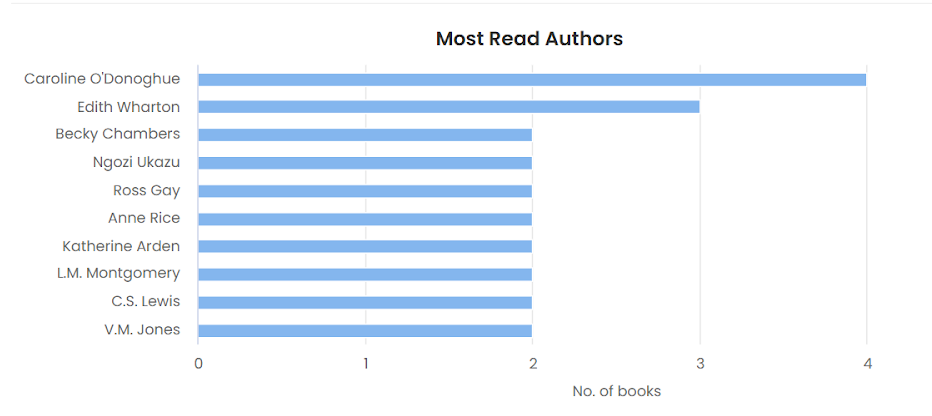
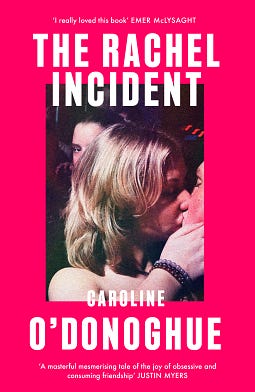
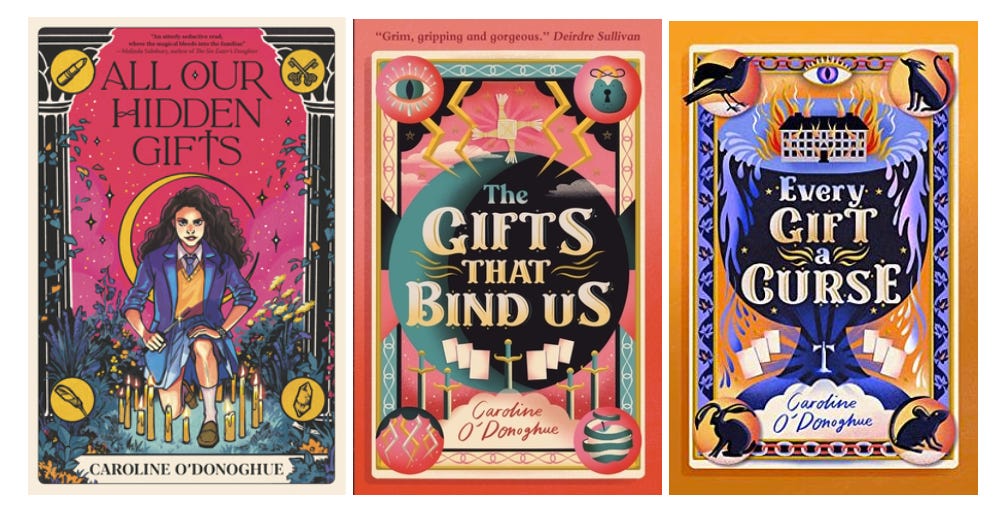


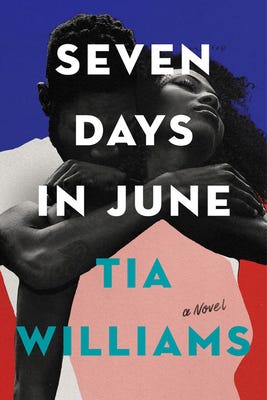
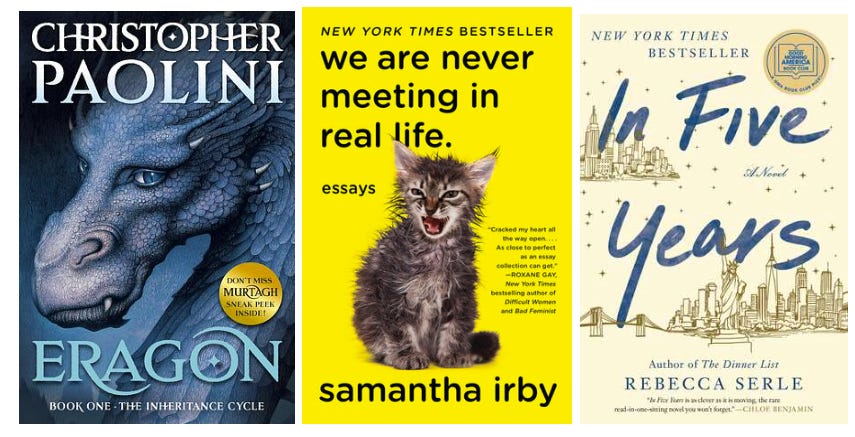
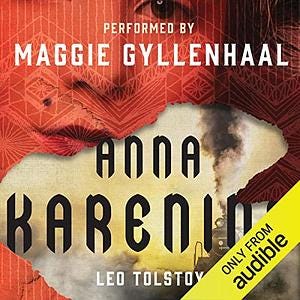


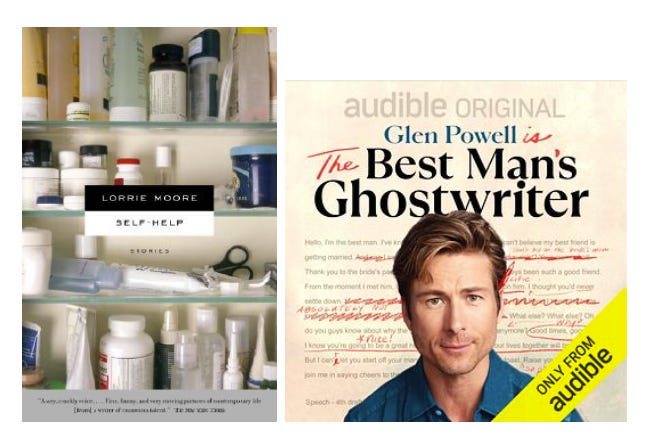
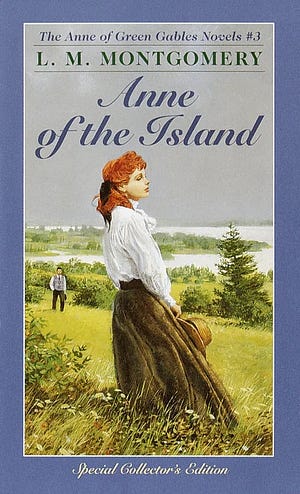
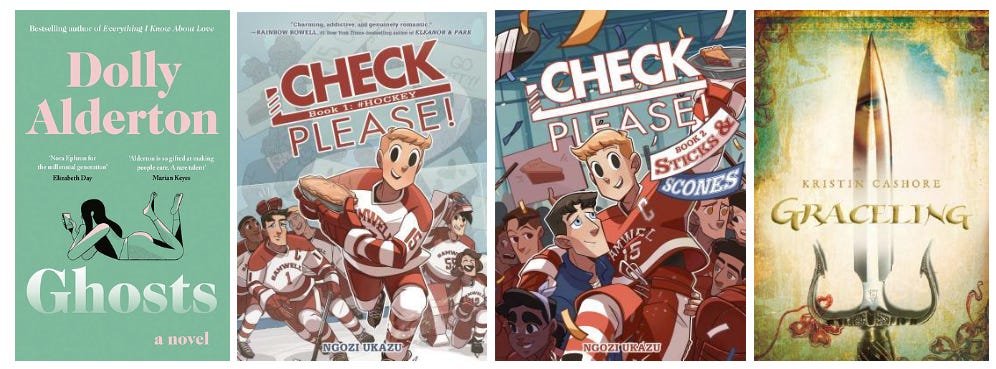

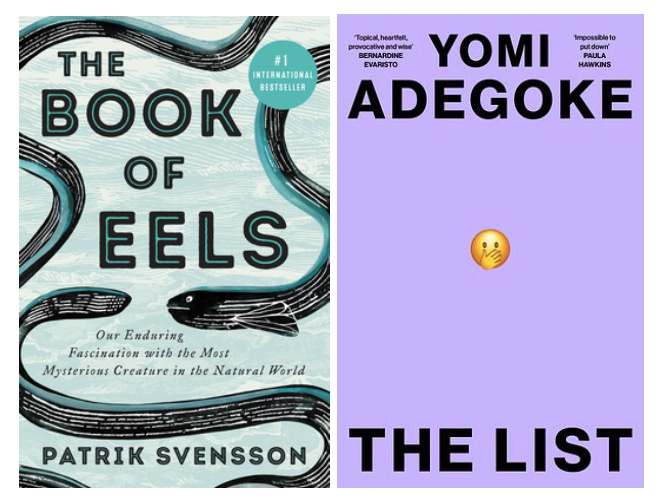
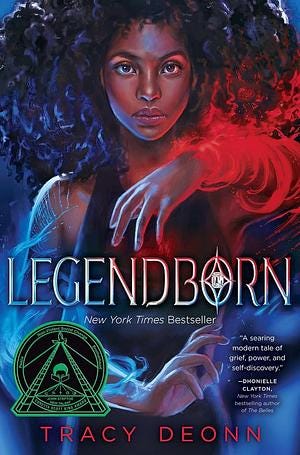
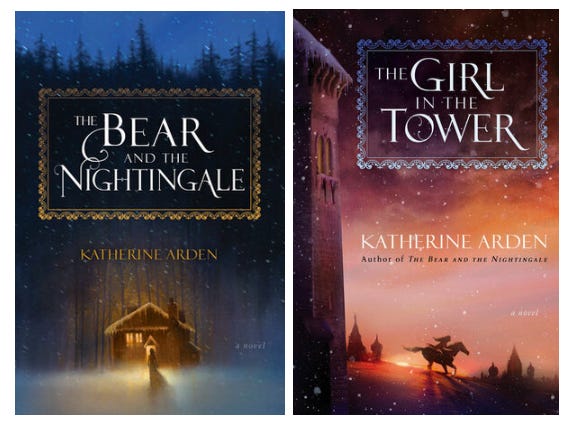
i also hope i am not evil